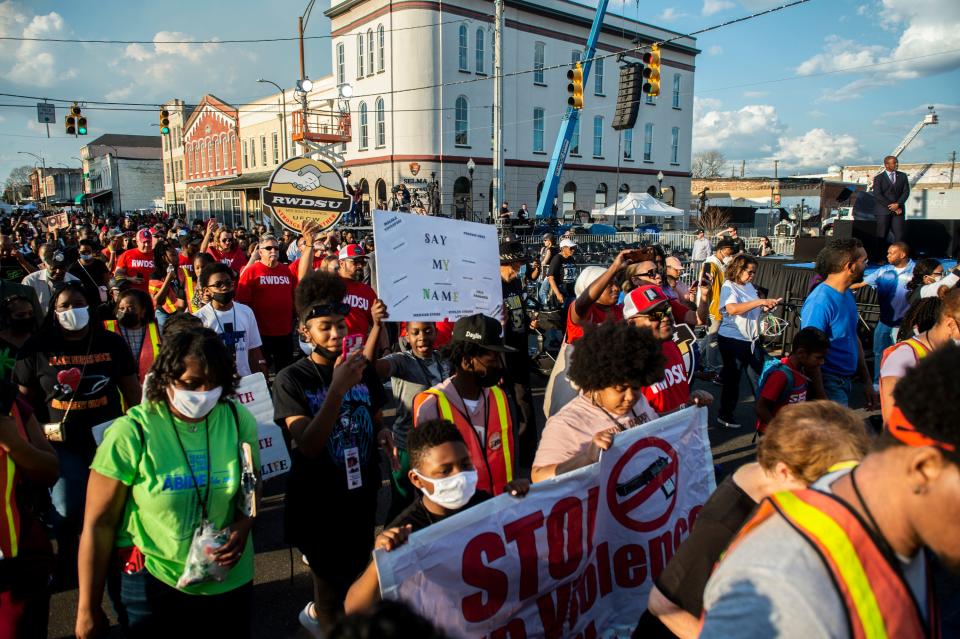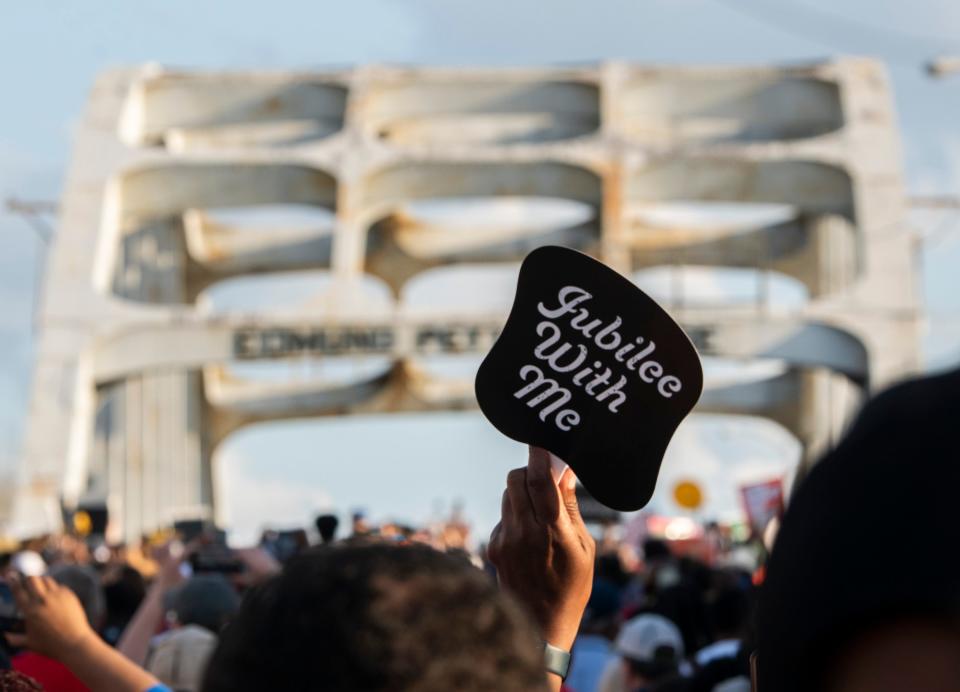‘Time to march’: Hundreds gather in Selma to commemorate 57th anniversary of Bloody Sunday
- Oops!Something went wrong.Please try again later.
- Oops!Something went wrong.Please try again later.
- Oops!Something went wrong.Please try again later.
Under blue skies and in sweltering heat, a crowd of hundreds marched across the Edmund Pettus Bridge in Selma on Sunday afternoon to honor the men and women who walked that same path 57 years earlier.
Vice President Kamala Harris and the families of Martin Luther King Jr. and John Lewis led the pack.
On March 7, 1965, another crowd of hundreds, including Lewis, walked across the bridge to peacefully protest for the right to vote. State troopers met the civil rights activists with violence, brutally beating and tear-gassing them in an attempt to turn them back. The day became known as Bloody Sunday, and it shocked the nation into the passage of the Voting Rights Act of 1965.
In the years since, community members and leaders have returned annually to cross the bridge. U.S. Secretary of Transportation Pete Buttigieg, the Rev. Al Sharpton and the Rev. Jesse Jackson were among those who joined this year.
“Today, we stand on this bridge at a different time,” Harris said before the march began. “We again, however, find ourselves caught in between. Between injustice and justice. Between disappointment and determination. Still in a fight to form a more perfect union, and nowhere is that more clear than when it comes to the ongoing fight to secure the freedom to vote.”

Harris pointed to the record voter turnout in the 2020 election and said, “Some saw it as a threat.” She noted that both the Freedom to Vote Act and the John Lewis Voting Rights Advancement Act failed in the U.S. Senate last year.
“I am here in Selma to say, thank you for your work, your sacrifice and your dedication,” Harris said. “And I have come here today to also remind you that we all stand together.”
Many of the organizers involved in the event, also called the Selma Bridge Crossing Jubilee, see it as an opportunity to recommit to voting rights activism each year.
“With the pandemic just worsening, deepening and exposing already existing fissures of racism and poverty, and low wages and the lack of health care, and so many other kinds of social ills, we think it's it's really important to make sure that we've learned the lessons and we keep putting them into action,” the Rev. Liz Theoharis said.
With the Rev. William J. Barber II, Theoharis is the co-chair of the Poor People's Campaign. The group is one of several annual sponsors of Jubilee, and outside of the first weekend in March it aims to unite marginalized people and increase voter participation and policy change across the country.
“Dr. King linked the right for voting rights to the fight for living wages and economic justice,” Barber said before the crowd marched across the bridge on Sunday. “Selma was about a commitment to bring the masses of Black people and poor white people together in the South to build a mighty voting bloc that could rebuild the economic architecture of the nation toward justice.”
Another aspect of the commemoration was inspiring new generations of activists.
Youth coordinator Elliott Smith brought a delegation of university students to Selma for the weekend to learn about the city’s history firsthand from the people who lived it. Many of the Selma foot soldiers who marched and experienced the Bloody Sunday attacks in 1965 still live in Selma and come to the Jubilee each year. They share their experiences, and Smith said his group was able to receive valuable advice from foot soldiers this year.
“A lot of young folks don't really get that, not only that experience of talking to foot soldiers, but even understanding the history of Selma,” he said. “It was interesting to see just different examples of how they got involved in the movement.”
For Smith, he grew up on trips to Selma. His great-aunt Amelia Boynton Robinson was one of the civil rights leaders who marched on Bloody Sunday, and she also helped organize the 1968 Poor People's Campaign. Smith remembers hearing her stories and learning about how she accomplished all that she did.
“I consider myself a movement baby,” he said.
More: The 'quiet heroes' of the world

Now, he works with dozens of activists to shift the narrative around poverty and impact the policies that affect them.
“My great-aunt, Amelia Boynton, and her husband, Sam Boynton, were so good at doing that. They didn't sit on the sidelines when Jim Crow reared its ugly head again,” he said. “They kept on fighting and fighting and fighting.”
That was the spirit in Selma on Sunday afternoon. Even as the breeze stopped and water bottles emptied, the crowd stayed, waiting for hours to complete the commemorative march.
At some points, huddles of individuals would break into song, belting off-the-cuff renditions of hymns and calling out phrases like, "We will not be moved."
Ultimately, though, once the speeches ended, the crowd had one final chant: "Let us march."
Hadley Hitson covers the rural South for the Montgomery Advertiser and Report for America. She can be reached at hhitson@gannett.com.
This article originally appeared on Montgomery Advertiser: Kamala Harris honors Selma's history at 57th anniversary Bloody Sunday

